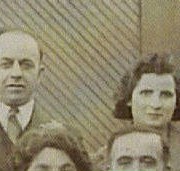Elias and Julia Joseph, Part Two
This is the second part of my story about Elias and Julia Joseph, brother and sister. Elias’s story was the first part, and can be found at the link below. If you haven’t already read Elias Joseph’s story, I advise you to read his story first, because there is some important introductory information that is vital to the story.
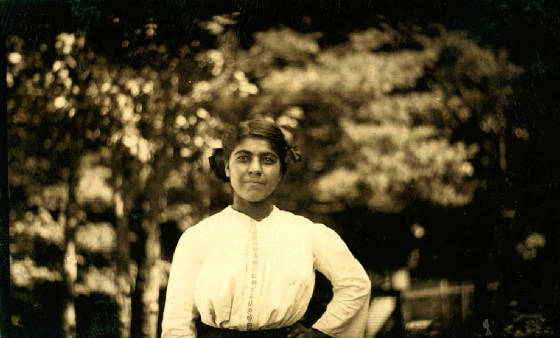
Lewis Hine caption: Illiterate 19-year-old sister of B. Joseph. Location: Winchendon, Massachusetts, September 1911.
Lewis Hine occasionally took photos of older children, usually indicating in his captions that they had started working in the mills at a young age. It was probably Sunday, September 3, when he spotted this lovely girl dressed for Mass at St. Mary’s, now called Immaculate Heart of Mary. It would have been about a two-mile walk from her home at 55 Glenallan Street.
Julia Joseph was the oldest sister of Elias, but she was 16, not 19, as Hine had written when he took this photograph. She was born in Lebanon in 1895. Many members of the Joseph family recognized her immediately, including two of her sons and a daughter. Like Elias, she arrived in the US from Lebanon in 1906, with her mother and siblings. Her father had come over earlier. They headed straight to Winchendon. It is likely that she began working in the White Bros. mills right away, along with most of the rest of the family. She also moved with them to Fitchburg a few years later, and spent the rest of her life in that city, working for many years in a yarn mill. She passed away on May 19, 1980.
I interviewed her youngest child, Edward Tuliano, who still lives in Fitchburg, and also communicated with her oldest, Paul, who wrote a beautiful testimonial to her.
Edited interview with Edward Tuliano (Ed), son of Julia Joseph, conducted by Joe Manning (JM), on March 25, 2009.
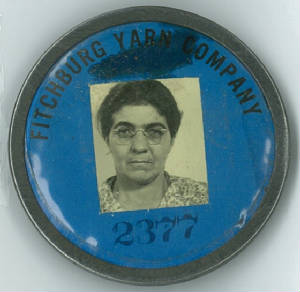
JM: When were you born?
Ed: March 30, 1937.
JM: Where were your parents living then?
Ed: On a farm at 64 Buttrick Avenue, in Fitchburg. I was born at home there. My dad built the house.
JM: How many children did your parents have?
Ed: I was the seventh and last.
JM: What was your father’s name?
Ed: Domenic.
JM: Where was he working at the time you were born?
Ed: Fitchburg Yarn.
JM: How many years had your parents been married when you were born?
Ed: About 13 or 14 years.
JM: Did your mother work while the children were growing up?
Ed: Yes, also at Fitchburg Yarn. I believe they met there.
JM: Who was taking care of the children when they were working?
Ed: My dad worked nights. He got off work at 6:00 in the morning, and then my mom went to work at 6:00 in the morning. When I was very young, we had an outside babysitter for a while.
JM: When did your mother move to Fitchburg from Winchendon?
Ed: I don’t know. It would have been whenever the whole family moved.
JM: How close did you live to your mother’s brothers and sisters? And did you see them often?
Ed: They lived on the other side of town. They would come down sometimes to buy vegetables from us. We had a huge garden. We saw my mother’s sister, Lila, quite often. We were quite close with her.
JM: Did your mother continue to work a long time after you were born?
Ed: She worked until she was 65, the whole time at Fitchburg Yarn. And my father worked there for many years until he retired. They were both spinners.
JM: Did your mother ever talk to you about living in Winchendon?
Ed: Not much, but in the 1950s, she brought my wife up to Winchendon several times to meet Cecile and Catherine Joseph, who owned Joseph’s Store. We were related to them. Mom showed my wife where she had lived on Glenallan Street.
JM: My research shows the house was at 55 Glenallan Street, but it’s gone, and there’s a cemetery there now.
Ed: That’s right.
JM: In his caption, Lewis Hine said your mother was illiterate.
Ed: She had three months of education, and that was it. She learned to read the Bible a little, but she couldn’t write. My father couldn’t read or write either.
JM: What was it like to have parents who couldn’t read and write?
Ed: I thought it was kind of sad, because they missed a lot. They couldn’t read the newspaper. My mother could just a little bit, maybe a paragraph. I can remember Dad going through the funnies in the Sunday papers, with me on his knee, explaining them to me by looking at the pictures. But he couldn’t read the captions. His favorite was one called Henry.
JM: When you were older, did you ever read for your parents?
Ed: Yes. When my two brothers in the service wrote home, we kids used to read the letters to them. I remember them wanting us to read them time and time again.
JM: How did World War II affect your family?
Ed: It was worrisome. Paul, my oldest brother, was overseas, and James, the third oldest, was stationed in California. The whole family would pray for them. I’ll tell you how it affected me. It was a long time before I could bond with Paul. When he left for the service, I was very young. At that point, I completely forgot him. When he came home on a furlough one time, Mom and I were down in the basement, and when he stood on top of the bulkhead looking down in, I was frightened. I started crying, and I went and hid. I didn’t know him. After a while, it got to be okay. World War II robbed a lot of youngsters from bonding with their older brothers.
JM: How many days a week did your parents work?
Ed: Five. They were off Saturday and Sunday. Dad had to go back to work Sunday night.
JM: What did your family do together on weekends?
Ed: We would go on picnics at Otter River (State Forest), up in Winchendon. And we would go joy riding. We loved to go and pick wild blueberries up in the mountains. We would come home and clean them up, and Mom would can them. She would can all the vegetables in the garden, and we would eat them all winter long.
JM: Did your mother speak Lebanese?
Ed: Only when she got together with her family. She spoke English at home.
JM: What was your mother like?
Ed: Mom was a very hard-working person, and a very caring person. She had a temper if she got upset with anything. She could raise her voice. She also had a heart of gold. Everybody liked her, at work and in the neighborhood.
JM: How did your mother manage to take care of the household while both she and your father were working?
Ed: She got a lot of help from us kids. We all had our duties. I was in charge of washing the floors. Both my parents did the cooking. Dad was a good cook. He would make us lunch and Mom would cook dinner.
JM: Did you live in a household where there was lots of play, and joking around, music, and things like that?
Ed: It was a busy household, with all the chores we had to do, like working in the garden.
JM: Did all the children graduate from high school?
Ed: Paul did, and then he went to Stevens Business College here in Fitchburg. He spent 37 years in the Army, 19 years active duty in Europe, and 18 years in the active reserves. Jim left school to work as an auto mechanic. He was in the Navy, and later went into the landscape business. Louis graduated from high school and spent about 23 years in the Air Force. Ernest worked for a construction company in Kentucky and other locations in the South. I also left high school, but I went back and got my GED. I spent most of my working years in the manufacture of upholstered living room furniture. At one time, I held a position of department steward and union vice-president, and then joined the management team supervising the fabric cutting and stitching department. I am now a full-time musician. My two sisters were busy at home raising children. Vincenzia had seven, and Ann had five.
JM: When you saw the Lewis Hine picture of your mother, did you know right away that it was her?
Ed: Oh, yes. She looked just like my sister.
JM: What did you think when you saw your mother and Elias in the pictures?
Ed: It was hard to fathom, especially that picture of my uncle Elias working at that young age. And I had never seen a picture of my mother at that age. Before her marriage, I don’t know much about her life, let alone having pictures of it.
JM: What do you think about the fact that the photos are in the Library of Congress, and that they were taken by such a famous photographer?
Ed: It’s quite an honor and privilege that part of their history has been recorded. But I felt a certain amount of sorrow that my mother and her brothers and sisters had to go to work so early in life.
JM: Immigration records show that your mother came to the US in 1906, landed at Ellis Island, and was bound for Winchendon. She probably went to work as soon as she got there, which means that she would have been working at the mill when she was 11 or 12.
Ed: The immigration manifest in 1906 didn’t mention my grandfather Nashim. I understand that he came over before the family did.
JM: When did your mother die?
Ed: 1980. She was 85 years old.
JM: Did she live in her house all her life?
Ed: She passed away there.
JM: Can you tell me anything else about your mother?
Ed: I can remember walking down to the bus stop with my dad to meet her when she came home from work. Every so often, she would have a bagful of donuts for us. We kids used to dig into that bag as we walked back to the house, while she talked with my dad about her day, what happened at the mill, and so on. On Sunday around noon, Mom used to turn the radio on to the Arabic Hour. It was on a Worcester station. I loved the music, but I didn’t know what they were singing about. I can still hear it, and I can still see my mother sitting by the radio.
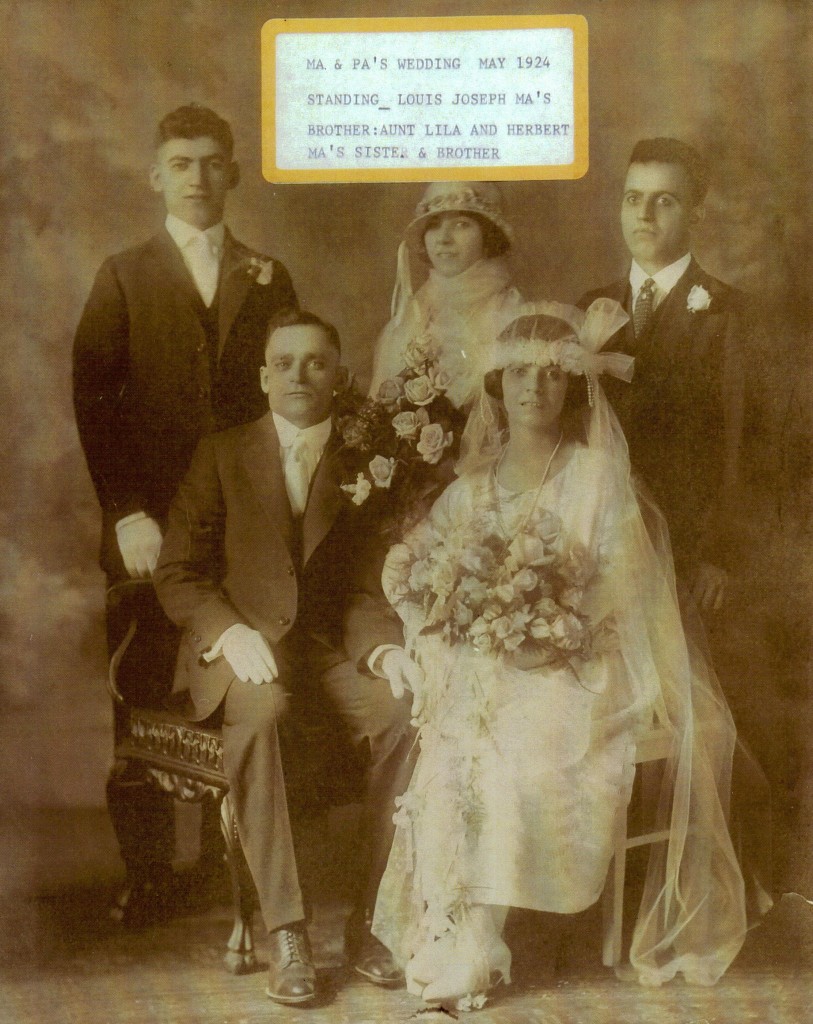
The following (slightly edited) was written by Paul Tuliano, Julia’s oldest child. He sent it to me by email in March 2009.
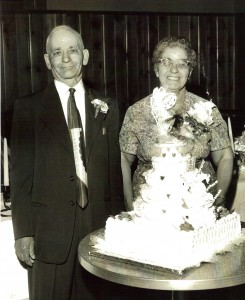
My mother did not go to school or college. The culture at the time was that the girls went to work and not to school, but consider the following:
My mother lived and survived the Great Depression by working hard, raising a family of seven children, five boys and two girls. All but two of the boys graduated from high school. Three sons served honorably in the military, including one son who served 33 months in World War II (England, France and Germany), followed by service during the Korean War, and one year in Vietnam. Another son also served in the Navy during World War II, in the Pacific Islands. A third son served 22 years in the U.S. Air Force during the Korean War and the Vietnam War.
My mother helped my father raise a large garden where many of the vegetables were canned for the winter, and also raised many chickens, not only for eggs on a daily basis, but also for food. My mother did a lot of sewing when we were small kids, including knitting and crocheting clothes for her children. My mother also obtained a driver’s license in her late 50s. My mother also became a naturalized citizen together with my father, who also did not go to school in his birthplace, Italy. He came to the United States alone at the age of 16, traveling to Boston’s North End where most Italians emigrated after leaving Ellis Island.
My mother and father and their seven children were truly part of the “Greatest Generation,” as coined by NBC news anchor Tom Brokaw, in his famous book.
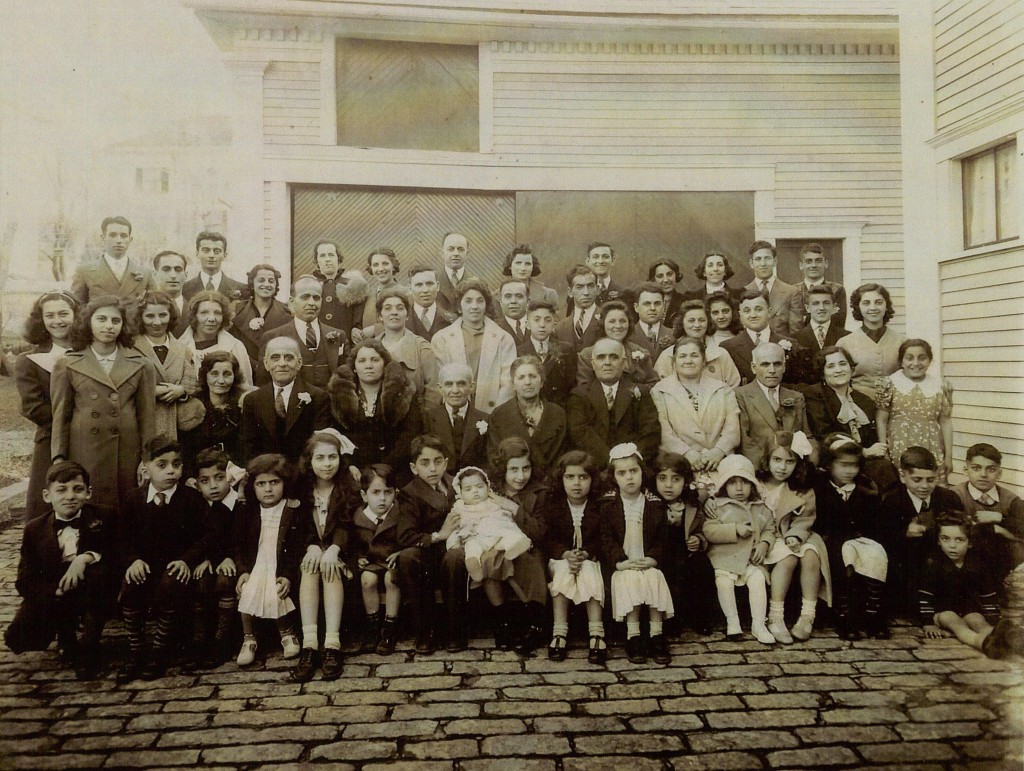
*Story published in 2009.
